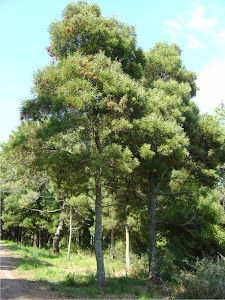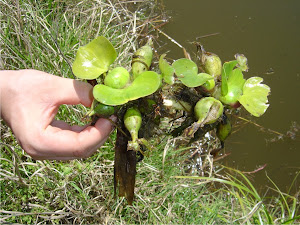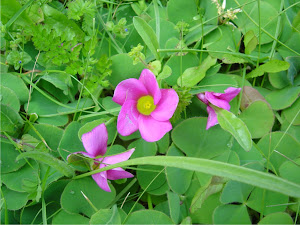Insofar as it seems odd, plants escape as well!
GARDENING AND HORTICULTURE
Introduced invasive plants into gardens or artificial ponds could spread transported by the wind or animals such birds or small mammals.
At present we already know the invasive potential of a large number of ornamental plants for our ecosystems. For this reason, the first step we have to take is the avoidance and cultivation of these plants, some of them already known as invasive such the Pampas Grass (Cortaderia selloana), the Hottentot Fig (Carpobrotus edulis), the Sour Fig (C. acinaciformis), and the Silver Wattle (Acacia dealbata).
Plant preferably native species (autochthonous). Although many alien species are not invasive, autochthonous plants offer other benefits by providing shelter and food to the native fauna.
When you buy seeds or plants both in a shop and through the Internet, pay particular attention to what are you purchasing because you could introduce a new invasive species. If you notice your usual plant nursery sells invasive plant species, express them your concern for problems arising from their potential introduction.
For any doubt it is preferable you consult an expert.
We can advice you.
Avoid purchasing seeds mixtures, especially those labelled as “wild flowers” as well as those which labels don’t provide information on the product.
Many of these mixtures contain invasive alien species.
Artificial ponds are becoming every day more popular as decorative elements for gardens. Before purchasing your plants consult with some expert in botany (universities, botanic gardens, conservation organizations, etc.). Likewise never throw aquatic ornamental plants from your garden or aquarium to waters or drainage systems.
Many aquatic alien plants are highly invasive and cause irreversible damages to rivers, lakes and pools.
Remind many invasive alien plants can spread from seeds but from fragments too.
Never transport water, plants or animals from one waterbody to another!
BOATING AND FISHING
In particular do not release live fish or crayfishes. Likewise never release live baits (fishes or invertebrates) because they can adapt to the new environment. Under no circumstances, dump the bait packaging and/or remaining baits to the water. Use plastic bag and throw them into the trash.
Clean your boat by eliminating aquatic animal and plants embedded in the hull or from intakes, engines, propellers including trailers. Take extra care when washing especially in areas where invasive alien species are present to avoid their spread.
Remind that the washing must be carried out far from waters to avoid that organisms you eliminate have the chance to get there.
If you couldn’t manage to keep off embedded organisms with hot high-pressure water, wait for a week before using your boat in another waterbody.
If you are an angler clean carefully your gear (boots, nets, etc.) to prevent the spread of larvas and pathogens (e.g.. Aphanomices astaci).
A pet is for good!
PETS
If you decide to buy an exotic pet purchase it from shops where animals are properly certified, legally imported and parasites or diseases free.
Gather and demand information on your pet. What geographic area is it from? What kind of habitat does it leave in its country of origin? What is its scientific name? What does it eat?
This information will help you to take the better care over your pet and indirectly to protect your local environment.
Never release your aquarium fishes into a waterbody because they could establish stable populations and affect native fishes (depredation, competence for food, transmission of diseases, etc.). Likewise do not throw your ornamental aquarium (marine or freshwater) plants into rivers, ponds, estuary areas and sea.
If you no longer want your fishes try to return them to a specialised shop, give them to another hobbyist or donate them to a friend or a school.
Never release or abandon cats and dogs. They could cause serious damages by preying on small native mammals and birds populations.
Never release alien reptiles and amphibians (iguanas, red-eared sliders) because they may prey on a wide variety of native species and transmit diseases.
Protect yourself and your pet from new diseases and their vectors. Empty containers accumulating water because of the risk of alien mosquitoes breed in.
Never carry undeclared animals, plants, soil, seeds, etc., when arriving or leaving the country.
TRAVELING
Do not try to smuggle or carry animal products. Thy can be infected by pathogens causing infectious diseases to animals. Their introduction in the EU countries is submitted to sanitary controls.
To avoid administrative or criminal sanctions, travellers ought to know their obligation to submit these products to official controls.
Clean your boots soles and your gear before staring a trekking in a new area. Many weeds spread as hitchhikers under your boots or in your gear.
Abide by customs obligations and collaborate with inspection services to prevent the introduction of diseases, pests and other unwanted organisms.
GET INVOLVED!
Spread the information on threats related to invasive alien species sharing it with your family, friends, colleagues, neighbours, etc.
Learn how to recognize the more important invasive alien species. If you think you have found a new source of invasions, please contact immediately with us. Early detection is the key to avoid successfully a new invasion.
The GEIB Grupo Especialista en Invasiones Biológicas (ex GEI Grupo Especies Invasoras) is a nationwide independent organization developing its own projects and providing technical assistance and consultancies in the field of biological invasions.

Headquarters: C/Tarifa 7, E-24193 Navatejera (León), Spain. E-mail: geib.org@gmail.com // geib.uc@gmail.com
Blog Archive
-
▼
2007
(15)
-
▼
11
(15)
- Spanish - Castellano
- NEWS
- FACTS
- GREEN ALLIANCE
- "EEI 2006" 2nd NATIONAL CONFERENCE ON INVASIVE ALI...
- GOALS
- The TOP 20. The 20 worst invasive alien species pr...
- BASIC CONCEPTS
- FAQ ON IAS
- WHAT YOU CAN DO TO PREVENT BIOLOGICAL INVASIONS
- INVASORAS E-LIST
- LINKS OF INTEREST
- DOCUMENTS OF INTEREST
- ABOUT US
- CONTACT US
-
▼
11
(15)
LET"S COOPERATE AMONG NGOs

A space for environmental cooperation
Acacia melanoxylon

Photo: GEIB (L. Capdevila-Argüelles)
Arctotheca calendula

Photo: GEIB (L. Capdevila-Argüelles)
Buddleja davidii

Photo: Forest & Kim Starr
Carpobrotus edulis

Photo: GEIB (L. Capdevila-Argüelles)
Cortaderia selloana

Photo: Forest & Kim Starr
Eichornia crassipes

Photo: GEIB (L. Capdevila-Argüelles)
Hedychium gardnerianum

Photo: Forest & Kim Starr
Eucalipto

Photo: GEIB (L. Capdevila-Argüelles)
Miconia calvescens
Photo: Forest & Kim Starr
Opuntia ficus-indica

Photo: Forest & Kim Starr
Oxalis purpurea

Photo: GEIB (L. Capdevila-Argüelles)
Oxalis purpurea

Photo: GEIB (L. Capdevila-Argüelles)
